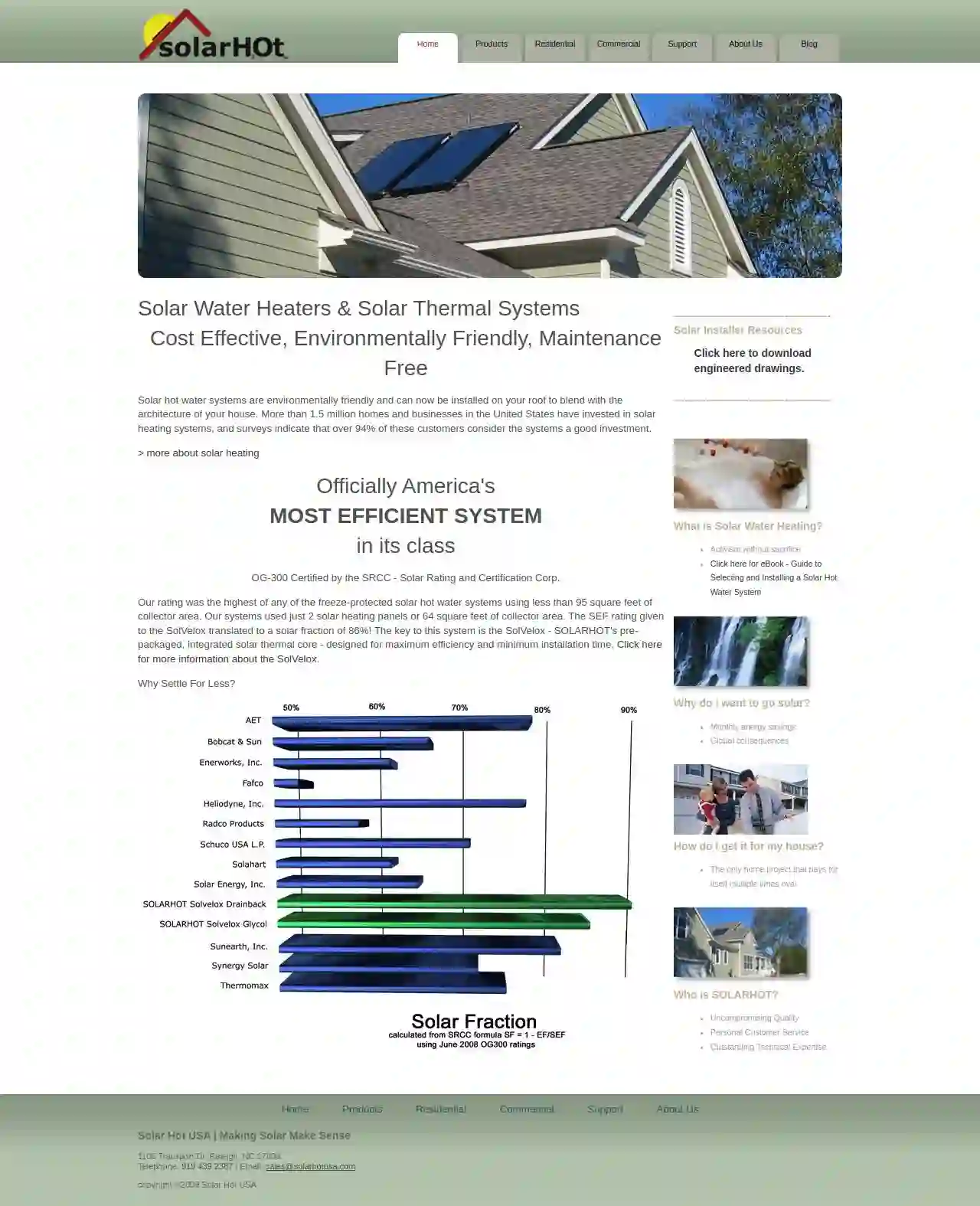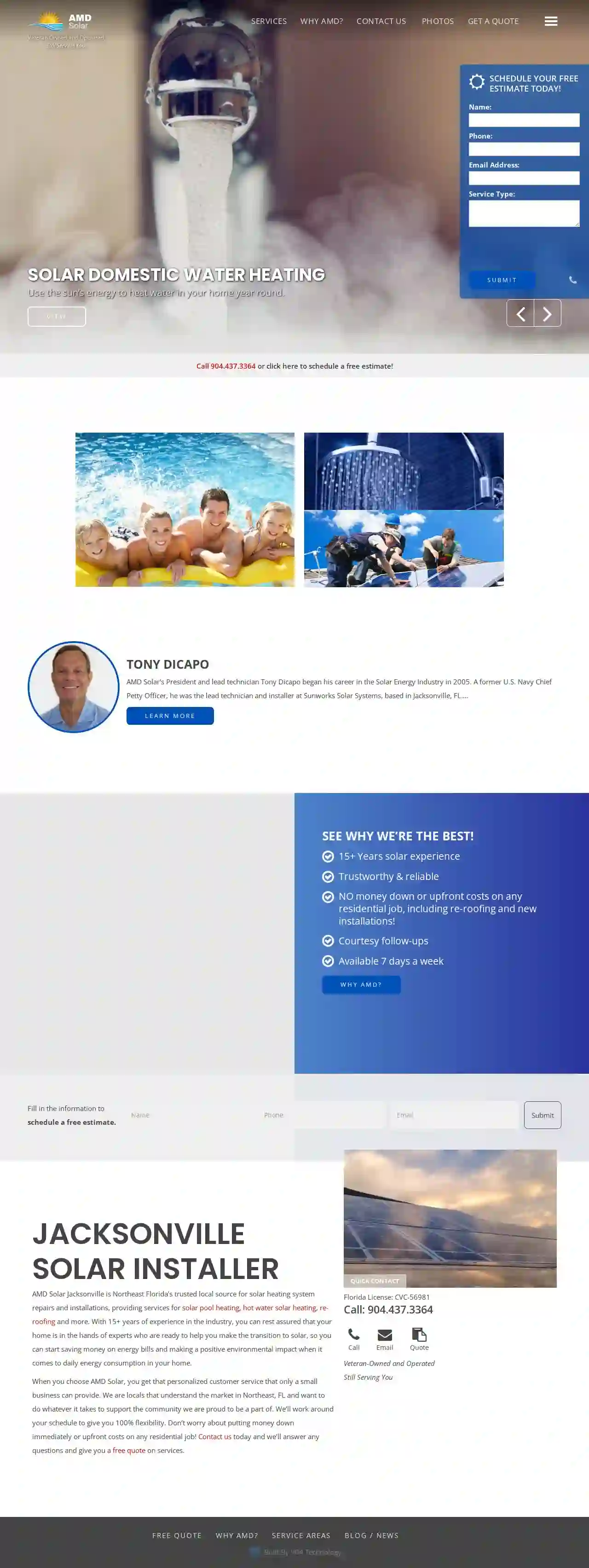Solar Installers Farmville
Top Solar Company in Farmville
Get multiple Solar Company quotes for your project today! Compare profiles, reviews, accreditations, portfolio, etc... and choose the best offer.

Quick Solar Solutions
58 reviews123 Solar Way, Suite 100, Raleigh, 27560, USQuick Solar Solutions, LLC is a reliable energy provider for homes and businesses, offering .99% financing and zero out of pocket solutions. They provide residential and commercial solar benefits, including drastically reduced power bills, tax credits, and increased property value. Their team is certified in Tesla Battery backup and Generac backup solutions, ensuring customers receive high-quality service and support.
- Services
- Why Us?
- Accreditations
- Our Team
- Testimonials
- Gallery
Get Quote
Solar Hot
2.17 reviews1105 Transport Dr, Raleigh, 27603, USSolarHot USA is a renewable energy manufacturer and solutions provider based in the Triangle area of North Carolina. They specialize in solar water heating systems, offering a complete line of products and engineering services for various projects. Their staff includes a registered Professional Engineer, ensuring that no job is beyond their ability to support. They are committed to providing high-quality products and personal customer service.
- Services
- Why Us?
- Accreditations
- Our Team
- Gallery
Get Quote
Astrawatt Solar
4.833 reviews3525 Roanoke Rd, Ste 110, Kansas City, 64111, USAstrawatt Solar is a professional solar panel installer with a mission to provide better solar experiences for customers. Founded in 2016, the company has grown to become the 3rd fastest growing solar company in the United States. Astrawatt Solar focuses on improving the sales process by educating homeowners and providing unparalleled customer service and quality workmanship. The company is vertically integrated, managing plans design, engineering, permitting, utility net meter applications, and the installation of solar panels in-house. Astrawatt Solar has dedicated service teams ready to help with technical support and warranty claims.
- Services
- Why Us?
- Accreditations
- Our Team
- Testimonials
- Gallery
Get Quote
ISSU Solar
226 N Front Street, suite 134, 226 N Front Street suite 134, Wilmington, 28401, USIntegrity Solar Systems USA is a reliable energy provider that helps homeowners make their homes sustainable with solar panels. They offer a variety of solar panels and financing options to make solar energy more affordable. Their services include solar panels, backup power systems, EV chargers, and whole house energy monitoring. Their mission is to restore the integrity of the entire solar process by providing customers with exact benefits, pricing, savings, and project timeframe during the decision-making process.
- Services
- Why Us?
- Accreditations
- Our Team
- Testimonials
- Gallery
Get Quote
Momentum Solar - Jacksonville
3120 reviewsSouth Plainfield, NJ, 3096 Hamilton Blvd, Building B, 07080, USMomentum Solar is a trusted solar installer in the US, providing quality solar panels and home solar systems with battery backups to lower energy bills and produce your own energy. They offer solar financing plans and government rebates that benefit homeowners across the US.
- Services
- Why Us?
- Accreditations
- Our Team
- Testimonials
- Gallery
Get Quote
AMD Solar
510 reviewsJacksonville, 32207, USAMD Solar Jacksonville is a trusted local source for solar heating system repairs and installations, providing services for solar pool heating, hot water solar heating, re-roofing, and more. With 15+ years of experience in the industry, you can rest assured that your home is in the hands of experts who are ready to help you make the transition to solar, so you can start saving money on energy bills and making a positive environmental impact when it comes to daily energy consumption in your home.
- Services
- Why Us?
- Accreditations
- Our Team
- Gallery
Get Quote
Solar Services USA
3.73 reviews220 North Main Street, Greenville, SC, 29601, USSolar Services USA is a leading provider of solar energy systems for residential and commercial properties. They offer a range of services including solar panel installation, energy monitoring, and solar system upgrades. With a focus on safety, knowledge, and upgradeability, Solar Services USA aims to provide customers with the best solar energy solutions. Their team is dedicated to finding solutions for any solar energy or electrical issues clients may have.
- Services
- Why Us?
- Accreditations
- Our Team
- Testimonials
- Gallery
Get Quote
1st Solar
519 reviews123 Solar Way, Suite 100, Charlotte, 28205, US1st Solar is a leading solar energy company dedicated to providing sustainable energy solutions. With a mission to empower individuals, businesses, and communities to embrace renewable energy, they offer a range of services including solar system installation, ground-mounted systems, system maintenance, and more. Their team of seasoned professionals is committed to delivering top-notch service and results, making them a premier destination for all solar energy needs.
- Services
- Why Us?
- Accreditations
- Our Team
- Testimonials
- Gallery
Get Quote
Renu Energy Solutions
4.6411 reviews801 Pressley Road, Suite 100, Charlotte, 28217, USRenu Energy Solutions is the Southeast's premier solar installer with over 5,000 solar energy and over 1,000 energy storage installations. Since 2010, Renu has consistently been the solar installer you can trust. Renu offers customized Residential and Commercial solar and energy storage solutions.
- Services
- Why Us?
- Accreditations
- Our Team
- Testimonials
- Gallery
Get Quote
Nova Solar
615 River Highway #1021, Mooresville, 28117, USNova Solar is a solar energy solutions provider that helps homeowners and businesses find the best solar products, warranties, finance options, and installers available to them. They offer premium solar and electrical equipment, ensuring quality in their work and customer service. Nova Solar aims to provide clean renewable energy, lower monthly bills, energy independence, and huge government tax incentives.
- Services
- Why Us?
- Gallery
Get Quote
Over 4,210+ Solar Companies on our platform
Our solar experts operate in Farmville & surrounding areas!
SolarCompaniesHub has curated and vetted the Best Solar Installers near Farmville. Find a top & trustworthy business today.
Frequently Asked Questions About Solar Installers
- Monocrystalline: Made from a single silicon crystal, known for high efficiency (typically 18-22%) and sleek black appearance.
- Polycrystalline: Made from multiple silicon crystals, slightly less efficient (15-17%) but often more affordable than monocrystalline.
- Thin-film: Made from thin layers of photovoltaic material, lower efficiency (8-12%) but can be flexible and lightweight.
- Use a Directory Like SolarCompaniesHub: We connect you with pre-screened, qualified solar installers in your area.
- Check Online Reviews: Look for positive reviews on Google, Yelp, and other reputable sources.
- Ask for Referrals: Get recommendations from friends, family, or neighbors who have gone solar.
- Verify Credentials: Ensure the installer is licensed, insured, and certified by reputable organizations (e.g., NABCEP in the US).
- Get Multiple Quotes: Compare quotes from at least 3-4 installers to find the best value for your project.
- Ask Questions: Don't hesitate to ask installers about their experience, warranties, and the process they follow.
- Tax Credits: Reduce your income tax liability based on the cost of your solar system.
- Rebates: Direct cash payments or discounts on the purchase of a solar energy system.
- Net Metering: Allows you to sell excess solar electricity back to the grid for credits.
- Renewable Energy Certificates (RECs): Tradeable credits representing the environmental attributes of your solar energy generation.
What are the different types of solar panels?
Do solar panels increase my home value?
How do I find a good solar installer near me?
Are there any financial incentives for going solar?
What are the different types of solar panels?
- Monocrystalline: Made from a single silicon crystal, known for high efficiency (typically 18-22%) and sleek black appearance.
- Polycrystalline: Made from multiple silicon crystals, slightly less efficient (15-17%) but often more affordable than monocrystalline.
- Thin-film: Made from thin layers of photovoltaic material, lower efficiency (8-12%) but can be flexible and lightweight.
Do solar panels increase my home value?
How do I find a good solar installer near me?
- Use a Directory Like SolarCompaniesHub: We connect you with pre-screened, qualified solar installers in your area.
- Check Online Reviews: Look for positive reviews on Google, Yelp, and other reputable sources.
- Ask for Referrals: Get recommendations from friends, family, or neighbors who have gone solar.
- Verify Credentials: Ensure the installer is licensed, insured, and certified by reputable organizations (e.g., NABCEP in the US).
- Get Multiple Quotes: Compare quotes from at least 3-4 installers to find the best value for your project.
- Ask Questions: Don't hesitate to ask installers about their experience, warranties, and the process they follow.
Are there any financial incentives for going solar?
- Tax Credits: Reduce your income tax liability based on the cost of your solar system.
- Rebates: Direct cash payments or discounts on the purchase of a solar energy system.
- Net Metering: Allows you to sell excess solar electricity back to the grid for credits.
- Renewable Energy Certificates (RECs): Tradeable credits representing the environmental attributes of your solar energy generation.